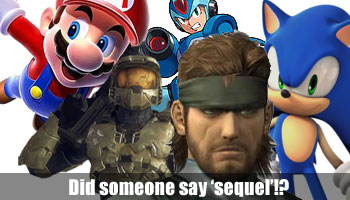Sequels: Are They Good For the Industry?
By Ziriux 17 Comments
One of my editorials I wrote when I was writing for my own blog a while back. Since it's interesting I thought I'd share it with you guys.
Written by Adam M. a.k.a Ziriux

The same runs true for Final Fantasy, and especially with Halo. I remember picking up my Xbox with a minimal choice of games. I was almost ready to put that big black brick away. That was, until I discovered Halo. Rushing to the store to pick it up, I started playing the game and was blown away by the sheer grandiosity of it. One of the signs of a great game is leaving you wanting more, and each of these titles are great games.

Many of us have been playing Call of Duty games since the series was first introduced on the PC. Activision shares the franchise with two different developers, Infinity Ward and Treyarch, while the fanatics of each developer will argue over which is superior, the Infinty Ward developed games are held as superior by the majority. Whether it’s sales, reviews or gameplay, Infinity Ward knows how to make a game that puts money in activisions pocket and satisfies millions of gamers at the same time. The majority of the series was set in World War 2 until Modern Warfare was released last year setting record sales numbers for the franchise. What does Treyarch do? They go right back to WWII and borrow the same concept from Modern Warfare, which seems to be working. Call of Duty is one franchise full of sequels, that never seems to get old. Hopefully Modern Warfare 2 continues this tradition when it’s released in November ‘09.
Every fan of First Person Shooter’s knows the name Halo. Developer Bungie has released 3 Halo games that have innovated the genre in some way. Halo: Combat Evolved saved the Xbox single handedly during its sales slump, the game sold over 3 million copies and brought the Xbox back into relevancy. Soon after the release of the original Halo, Bungie went right to work and developed the highly anticipated Halo 2, which sold over 10 million copies to date.
The game offered people an unrivaled online experience on consoles, allowing game types beyond your generic deathmatches and its groundbreaking matchmaking system arguably put Bungie on the map. The story wasn’t the best we’ve ever seen, but the multiplayer was the main attraction and was the real reason to stay. With the release of Halo 3 in September, 2007; we received updated graphics and an end to the story arguably “Finishing the Fight.”
Halo 3 brought multiplayer to a whole new level. The brand new Forge mode was a basic yet versatile map editor. The game also offered a film saving feature that had you spending hours looking through and picking out your best clips and uploading them to a Bungie-run community website. So what’s next for the franchise? An expansion to Halo 3, Halo: ODST is set to release sometime in 2009. Also in the mill is a rumor that Halo 4 is in development by Gearbox, creators of the Brothers in Arms franchise. Where is the Halo series going? We don’t know exactly, but there is much in store for this series, even though the fight is finished… Although it does leave us wondering, is Halo being stretched further than it can go?

This leads to a few other questions. Should game franchises be released on a yearly basis? Can a developer really put out quality in the short amount of time? These are questions that the developer needs to address in the decision they make about sequels. Activision seems to be doing alright switching between Treyarch and Infinity Ward every year, but can other developers afford to do the same, or is the extra year or two worth the wait. We can only see as time goes on.
Your thoughts? Please comment.
